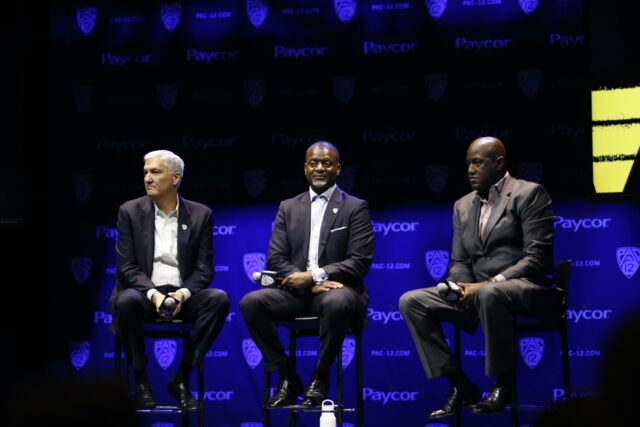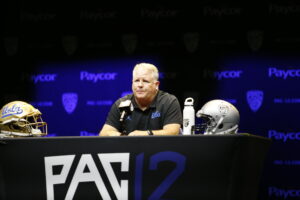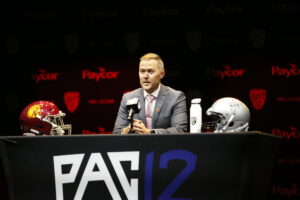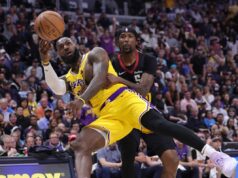
Los Angeles, CA — The Pac-12 Conference’s schools assembled Friday at a downtown theater for their annual football media day — it had a feeling of a awkward family reunion.
U.C.L.A. and USC, the West Coast athletic foundation announced a month ago that they would be leaving for greener pastures in the Big Ten, and was hoping that their now distant cousins would remain kinfolks.
“It feels strangely familiar,” said Lincoln Riley, the new U.S.C. coach, who went through a similarly experience at Oklahoma, which along with Texas announced it would be jumping to the Southeastern Conference from the Big 12. “There’s been some hard feelings, but everyone has kept it professional.”
Now that the heartbeat of the conference are leaving, the show must go on without them. PAC-12 commissioner George Kliavkoff opened the conference’s media day acting unfazed by the recent departures.
U.C.L.A. Coach Chip Kelly, responding to a question from a French Canadian reporter, quipped, “We’re expanding, but we’re not going to Quebec.”
Kliavkoff outlined a detailed contingency plan for the defection, he explained why he feels “bullish” on the future of the diminished conference and where he hopes college sports will be heading next.
“We think the 10 remaining schools are going to significantly benefit in recruiting from UCLA and USC’s decision in every sport other than football,” Kliavkoff said.
Here are the takeaways from Kliavkoff’s media day:
Kliavkoff said he personally instructed everyone to play nice for the next two years until USC and UCLA join the Big Ten conference in 2024, but when asked whether reconciliation is possible, he didn’t appear optimistic.
“I think it’s unlikely,” he said after noting UCLA is in a “difficult” situation as regents will meet later this year to review the move. “But if they came back, we will welcome them back.”

His comment raised eyebrows from the full room of reporters. It must of felt a little uncomfortable for the commissioner answering the abundance of questions about the defection, especially after talking about trust and teamwork to ensure the future of the PAC-12.
“That remark was a reflection of the fact I’ve been spending four weeks trying to defend against grenades that have been lobbed in from every corner of the Big 12 trying to destabilize our remaining conference,” Kliavkoff said. “I understand why they’re doing it, when you look at the relative media value between the two conferences. I get it, I get why they’re scared, why they’re trying to destabilize it. I was just tired of that.”
Contingency Plan
Kliavkoff said he’s “bullish” on the future of the PAC-12’s long-term growth, stability, and success and has been instructed by board members to focus on enhancing the value of the conference’s media rights and initiating the media rights negotiations in addition to exploring expansion.
Improving media rights includes creating made-for-TV events like the conference baseball and softball tournaments, elevating non-conference competition and adding various revenue streams. Kliavkoff mentioned that the PAC-12 is the first Power 5 conference to sell rights to its data.
“Southern California is really important to us,” he said. “I think there are different ways of approaching staying part of Southern California. We may end up playing a lot of football games in L.A.”
“Even with the loss of our two L.A. schools, after the current cycle of media rights deals, we will be very well positioned among the Power 5 from a revenue per school standpoint,” Kliavkoff said.
No Biggie
Kliavkoff tried to maintain his professional decorum throughout the media day conference but still fired a few shots at USC and UCLA for leaving. Echoing that the decision was based on money, it could add $50 to $70 million annually in television revenue — that sells out athletes, who will have to travel repeatedly to the East Coast for conference games.
“Increased revenue can help us support our student-athletes but a singular focus on money will certainly cause more harm than good,” Kliavkoff said in his opening statement. “Our long-term measure for the success of college athletics cannot be how much money we consolidate into 10 or five or two conferences, but rather should be our ability to support the largest number of student-athletes while still facilitating competition between schools and conferences. We should be measuring how many lives we can change.”
Kliavkoff also mentioned the effect of travel on athletes, another jab hurled at USC and UCLA when they join the Big Ten conference.

“Obviously I’ve been asked once or twice today about the conference realignment. Obviously we’re aware of it. It’s certainly an impact mostly in recruiting right now, USC coach Lincoln Riley said. But certainly would like to keep the focus as much as we possibly can on the PAC-12 Conference, our team this year, all the great players, potentially great teams in this conference. I think there’s a ton of excitement, and rightfully so.”
Kliavkoff singled out U.C.L.A., which he said had received criticism from athletes, parents, faculty, and politicians, including Gov. Gavin Newsom of California, who last week ordered the University of California to issue a report next month on the impact of the move on student-athletes and on U.C. Berkeley, the Northern California sister school of U.C.L.A.
“We think there’s immediate regret among almost every constituent in those communities, and we think those regrets are going to grow over time,” Kliavkoff said in an interview. “Those are bad decisions; those are financial decisions at the expense of student athletes.”
Kliavkoff, a former media executive who had no prior college sports experience when he took over the position last July, has spent the past month trying to keep his conference from imploding.
The commissioner also shot down the suggestion that the remaining PAC-12 schools would merge with the Mountain West, highlighted by remaining Southern California option San Diego State. Stanford athletic director Bernard Muir said the PAC-12 has not had “any formal overture from another conference.”
Recruiting
The closest Kliavkoff got to speaking about football on media day was answering a question on recruiting, saying his impression that the impact will be “neutral” for UCLA and USC as some West Coast recruits may not want to play all their road games two and three time zones away while others may want to play in the Big Ten conference.
The commissioners, in that news conference, were asked if there was a binding agreement?
Kliavkoff said it wasn’t necessary.
“It’s an agreement among three gentlemen,” he said.
Asked on Friday if he still stood by that statement, Kliavkoff forced a smile.
“That’s a great question,” he said. “But I’m not going to touch that.”





